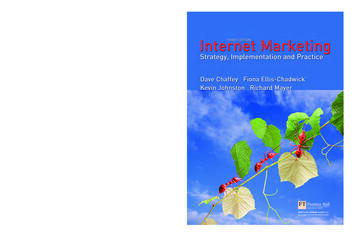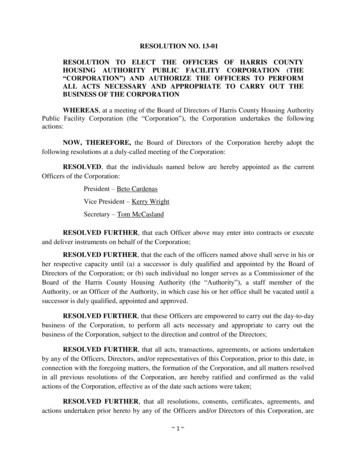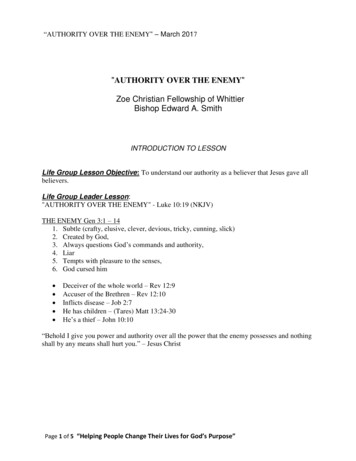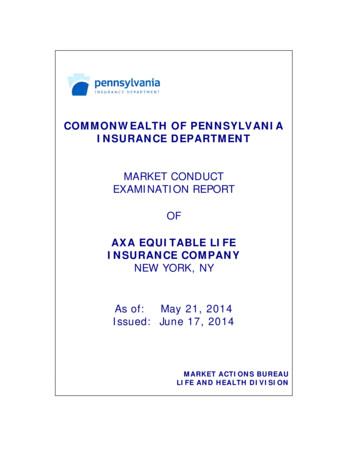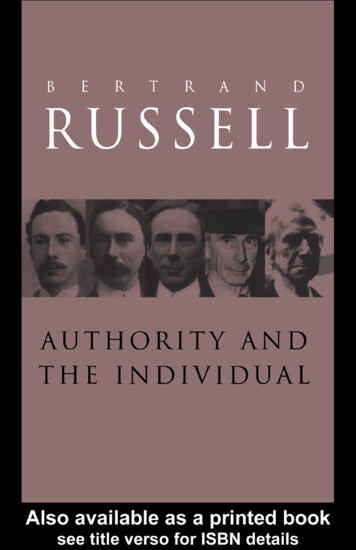
Transcription
Authority and the Individual
Russell at RoutledgeThe following books by Bertrand Russell are available fromRoutledge in paperback:ABC RelativityAnalysis of MatterAnalysis of MindAuthority and the IndividualBasic Writings of Bertrand RussellBertrand Russell’s BestCommon Sense and Nuclear WarfareConquest of HappinessEducation and the Social OrderFact and FictionFoundations of GeometryA History of Western PhilosophyHuman KnowledgeHuman Society in Ethics and PoliticsImpact of Science on SocietyIn Praise of IdlenessAn Inquiry into Meaning and TruthIntroduction to Mathematical PhilosophyLogic and KnowledgeMarriage and MoralsMortals and Others, volume 1Mortals and Others, volume 2My Philosophical DevelopmentMysticism and LogicOn Education
iiiOur Knowledge of the External WorldAn Outline of PhilosophyPhilosophical EssaysThe Philosophy of LeibnizPolitical IdealsPowerPrinciples of MathematicsPrinciples of Social ReconstructionProspects of Industrial CivilizationRoads to FreedomSceptical EssaysThe Scientific OutlookTheory of KnowledgeUnpopular EssaysWhy I am Not a Christian
Authority and theIndividualBERTRAND RUSSELLwith an introduction byKirk WillisLONDON AND NEW YORK
First published 1949Second impression 1955First published in paperback 1964Sixth impression 1974Routledge is an imprint of the Taylor & Francis GroupThis edition published in the Taylor & Francis e-Library, 2005.“To purchase your own copy of this or any of Taylor & Francis orRoutledge’s collection of thousands of eBooks please go towww.eBookstore.tandf.co.uk.”Introduction 1995 Kirk WillisAll rights reserved. No part of this book may be reprinted orreproduced or utilised in any form or by any electronicmechanical, or other means, now known or hereafterinvented, including photocopying and recording, or in anyinformation storage or retrieval system, without permission inwriting from the publishers.British Library Cataloguing in Publication DataA catalogue record for this book is available from the British LibraryLibrary of Congress Cataloguing in Publication DataA catalogue record for this book is available from the Library ofCongressISBN 0-203-98879-5 Master e-book ISBNISBN 0-415-11956-1 (Print Edition)
ContentsPrefatory NoteIntroductionvii11Social Cohesion and Human Nature112Social Cohesion and Government233The Role of Individuality374The Conflict of Technique and Human Nature495Control and Initiative: their Respective Spheres676Individual and Social Ethics81
Prefatory NoteIn the preparation of these lectures I have had the benefit ofvital assistance by my wife, Patricia Russell, not only asregards details, but as regards the general ideas and theirapplication to the circumstances of the present day.
viii
IntroductionFor nearly fifty years, the Reith Lectures have enjoyed adistinguished place in the cultural life of modern Britain.Traditionally delivered deep in the autumn and earlywinter, they honour the founding Director of the BBC, JohnReith. Proud, imperious, and vindictive, Reith was anautocratic administrator and formidable personality whosucceeded brilliantly both in bruising the sensibilities ofsubordinates and overseers alike and in creating one ofBritain’s most admired and durable institutions. True toReith’s insistence that the BBC make available to itsaudience the most eminent of speakers on the mostwideranging of subjects, the Reith lecturers have beenchosen for the breadth of their interests, the mastery oftheir subjects, and the ease of their ability to make difficultissues intelligible to a broad audience. Since 1948, theBritish public has therefore been enlightened mats, art historians and economists, theologians andtycoons.That the Reith Lectures would become so enduring aninstitution was certainly the ambition—if not honestly theexpectation—of their creator: the Board of Governors of theBBC. To the Board, in the difficult early months of post-warreadjustment, the establishment of the lectures wasintended not merely to honour Reith but, moreimportantly, to contribute to the understanding of aradically different world—a world of Labour governmentsand atomic energy, of European reconstruction andsuperpower rivalry, of imperialistic challenges andeconomic degradation Their ambition, indeed, was to
2 AUTHORITY AND THE INDIVIDUALcreate an annual radio version of the Gifford Lectures—anaccessible statement, aimed at a wide audience, by someof Britain’s most original thinkers and creative researchers.To inaugurate the series, and thereby both to set the toneand to establish the credentials of the lectures, the Boardinvited Britain’s most celebrated public intellectual—Bertrand Russell.Such a position in the good graces of the cultural andintellectual elite of twentieth-century Britain was at once apleasure and a novelty for Russell. Indeed, the decadeimmediately after the end of the Second World War markeda rare moment of public respectability for Russell, ��hadfluctuated (and would continue to fluctuate) wildly over thecourse of his extraordinarily long life. Born in 1872 intoone of the most eminent and secure families of Britain’sWhig aristocracy, Russell had made his intellectualreputation in the two decades before the outbreak of theGreat War. Ensconced in a Cambridge lectureship in logicand the philosophy of mathematics created especially forhim, he had enjoyed two decades of uninterruptedintellectual achievement. With works ranging from An Essayon the Foundations of Geometry (1897), to A CriticalExposition of the Philosophy of Leibniz (1900), to ThePrinciples of Mathematics (1903), to The Problems ofPhilosophy (1912), to Principia Mathematica (3 vols, 1910–13), to over thirty major articles in British, French, Italian,and American journals, Russell had won renown not simplyas a formidable logician possessed of a rare technicalsophistication and an even rarer stylistic virtuosity but asthe chief proponent of a new and powerful technique ofintellectual discourse—analytic philosophy. On the eve ofthe First World War, indeed, Russell had been indisputablythe most celebrated and influential philosopher in theEnglish-speaking world.The outbreak of the Great War, however, had transformedRussell’s life; if his philosophical work had brought himfame, the Great War made him notorious. Although neveran archetypically cloistered Cambridge don—he had beenactive in the tariff reform campaign in 1903 and thewomen’s suffrage movement from 1907 and had begun an
INTRODUCTION 3aborted campaign for Parliament in 1910— Russell hadnone the less not been a public man. But as Britainmarched remorselessly to war in the summer of 1914,Russell threw himself first into the neutrality campaign andthen into the anti-war movement—speaking, writing,organizing, and counselling. No pacifist, Russellpassionately believed that this particular war—not all war —was a mistake; indeed, it offended his every politicalinstinct and moral principle. And as the war lengthenedand Britain’s commitment extended, Russell’s oppositionhad sharpened—to mistreatment of conscientiousobjectors, to the suppression of civil liberties, and to thewastefulness of British commanders. This opposition—strident, unrelenting, and bitterly unpopular—was thedefining experience of Russell’s life; not merely didemotions run so high on all sides that Russell alienatedfriends, exasperated allies, and infuriated authorities, buthis appreciation that the war was genuinely popular with thevast majority of his fellow subjects at once appalled andcaptivated him. To explain that popularity—to account forthe belligerence and xenophobia of the British public andto fathom their susceptibility to the exaggerations of thePress lords and their indifference to the centralizingtendencies of their government—had become Russell’scentral intellectual and political task in the years after 1918.The inter-war years had therefore seen a very differentRussell devoted to a very different sort of work. Selfconsciously determined to become the Voltaire of thetwentieth century, Russell had engaged directly—and oftenin a very public manner—with an astonishing range ofissues in an effort to reconstruct society and regenerateindividuals so as to prevent a second military catastrophe.Lecturing, writing, teaching, and travelling, Russell sentforth not solitary spies but battalions of words to do battle—on political theory (Roads to Freedom (1918) and Power(1938)), on economic change (The Prospects of IndustrialCivilization (1923)), on history (Freedom and Organization1814–1914 (1934)), on the future of Asia (The Problem ofChina (1922)), on Russia (The Practice and Theory ofBolshevism (1920)), on education (On Education (1926) andEducation and the Social Order (1932)), on marriage and
4 AUTHORITY AND THE INDIVIDUALsexuality (Marriage and Morals (1929)), on mathematics (AnIntroduction to Mathematical Philosophy (1919)), onfascism (Which Way to Peace? (1936)), on science (The ABCof Atoms (1923), Icarus (1924), The ABC of Relativity (1925),and The Scientific Outlook (1931)), on popular philosophy(Analysis of Mind (1921) and Outline of Philosophy (1927)),and on religion (What I Believe (1925)). Although much ofthis writing and most of the journalism whichsupplemented it proved evanescent, it none the lessreached a wide audience and served to heighten Russell’snotoriety still further; indeed, for all that his liberal viewson religion, ethics, and sexuality had attracted the young,independent, and free-thinking, they had also offended thecomfortable, conforming, and established.The outbreak of the Second World War had found Russellteaching in America. Eager to return to Britain andembroiled in controversy over his popular writings, Russellhad been prohibited from returning by a British governmentall too willing to remember his earlier antiwar opinions andactivities but not to believe his current —and quite genuine—protestations of support for this conflict against NaziGermany and Fascist Italy. He had therefore remained inAmerica until the summer of 1944— writing, lecturing,teaching, and preparing the mammoth manuscript of whatwould become his most widely-read book, History ofWestern Philosophy (1945).Russell had returned not simply to England but toCambridge, and not merely to Cambridge but to TrinityCollege—where he had been an undergraduate in the1890s and a don in the 1910s, and from which he hadbeen driven in 1916 by a governing body unable to toleratehis anti-war opinions. Invited by his old undergraduatefriend and the current Master of Trinity, G.M.Trevelyan,Russell had recognized and happily accepted the fellowshipoffered him for what it was—an amends for earlier wrongsand a testimony to his continued standing as one of thepreeminent philosophers of the twentieth century. Toreturn to England, to Trinity, to Newton’s own rooms in theimmediate aftermath of the invasion of France and finalstages of the defeat of Germany meant much to Russell,who had left the Britain of the late 1930s sour and
INTRODUCTION 5pessimistic—angry at the evasions of British foreign anddefence policies, dismayed at the incapacity andunwillingness of National governments to relieve pervasivesocial and economic misery, and of two minds whether toraise his children as British subjects. But by 1944 that low,dishonest decade had passed, and the quick succession ofAllied victory, Labour triumph, and publishing success ofthe History of Western Philosophy all combined to liftRussell’s spirits and to allow his natural resilience andoptimism to blossom forth lavishly.At Trinity Russell had been received warmly by oldfriends and those few students not in military service. Withthe war’s end, followed hard by Labour’s victory and theHistory’s success, Russell found himself lionized. Notexpected by the college authorities either to teach or tolecture, Russell threw himself into both with a vigour andenthusiasm astonishing in a man of seventy-two. To hisdelight, he won a ready and receptive audience.Introductory lecture courses on such subjects as ethics,epistemology, and the fundamentals of philosophy filledthe largest lecture rooms Cambridge possessed tooverflowing. Derived in their essentials from his History ofWestern Philosophy (itself largely a compilation ofAmerican lectures), Russell’s lectures were memorableperformances —lucid, witty, irreverent, full of sweepingthemes and picturesque asides, and delivered with a briothat managed at one to enthrall his audience and toincarnate the moral seriousness and intellectual grandeurof philosophical study. To his listeners at Cambridge andreaders across the English-speaking world, Russell—thegrandson of Lord John Russell and godchild of John StuartMill—quickly came to seem not merely a living connectionwith Britain’s political and cultural greatness, but the robustembodiment of a western culture that had prevailed overthe evils of fascism and vanquished the horrors of nazism.Russell had thus come to be seen—and to see himself—notas a gadfly or a renegade but as an ornament of atriumphant Britain now determined to build a wholly newsociety on the sturdy and enduring foundations of thepast.
6 AUTHORITY AND THE INDIVIDUALAn appreciation of Russell’s unique standing as well as ofhis new mellowness soon spread far beyond Cambridge,driven in large measure by the remarkable sales of theHistory of Western Philosophy—sales limited only by theshortage of paper in an economically bereft Britain. Russelltherefore soon found himself a favourite lecturer of theBritish Council and, unimaginably to anyone alive in 1916,of the Foreign Office; at their behest, Russell travelled inthe next years to Switzerland, Norway, Germany, andFrance to lecture on such topics as ‘Culture and the State’and ‘Ethics and Power’.It was in this context of renewed respectability that theBBC discovered Russell. Firmly beyond their pale inthe 1920s and 1930s, Russell had been shunned by Reithand his successors as a dangerous radical bristling withextreme opinions. Now apparently more moderate andtrustworthy, he was invited to appear on the popular BrainsTrust programme late in 1944. So successful did hisappearance prove to be, that he was almost immediatelyasked to broadcast on ‘The Future of Civilization’ and thento debate such worthies as J.B.S.Haldane and FrederickCopleston. To the delight of BBC engineers and directors,Russell proved to be an almost model broadcaster—punctual, informed, lively, and provocative without beingoutrageous. By the end of 1946 it seemed the BBC couldnot get enough of him, and in January 1947 Russellcomplained of overwork ‘as the BBC has developed apassion for me’.1 It was therefore out of this popularity—both within Broadcasting House and without —that he wasinvited to be the inaugural Reith lecturer.The lectures were given as six half-hour talks onsuccessive Sunday evenings beginning on Boxing Day 1948.Written out completely beforehand and delivered inRussell’s somewhat reedy yet unnervingly precise voice,they were devoted to a theme about which he and otherliberal thinkers had thought long and hard: how is itpossible to ‘combine that degree of individual initiativewhich is necessary for progress with the degree of socialcohesion that is necessary for survival.’ Russell’s lectures,that is, were neither a progress report drawn from anongoing programme of research (as would be those of J.Z.
INTRODUCTION 7Young in 1950 and Peter Medawar in 1959) nor aculminating statement of a lifetime’s academic orprofessional work (as would be those of Bernard Lovell in1958 and Alastair Buchan in 1973). They were, rather, theproduct of a full forty years of reflection about the relationsof individuals and the state and about the evolving formspower and authority have taken in the twentiethcentury. Russell’s lectures, that is, neither summarizedcurrent research, nor presented new conclusions, nor laidout a new line of inquiry. Instead, they distilled his earlierthinking, drew together themes he had discussed in theinter-war years, meditated on the legacies of totalitarianstates (both vanquished and extant), and explained thechallenges liberal societies faced in the remaining decadesof the twentieth century.As Russell confessed early in his lectures, questionsconcerning the proper balance of state power (‘authority’)and human freedom (‘the individual’) have been at theheart of liberal political theory since at least theseventeenth century. But Russell’s discussion of them in1948 possessed an extra immediacy—an immediacy thathelps, in large measure, to account for their quiteremarkable popularity. Within Britain itself, as his listenerswere well aware, the advent of the Attlee Government in1945 had set Britain on a dramatic new course—ofnationalized industries and educational reform, of socialinsurance and the National Health Service—whichcumulatively entailed a sweeping extension of stateauthority over nearly every aspect of British society. Theimplications of that extension—for social cohesion,individual initiative, and personal responsibility—were atthe very heart of an intense, often bitter national debate—adebate not merely over the details of specific pieces oflegislation but also over the values, behaviour, andexpectations of each and every British subject. BeyondBritain, moreover, the establishment of Soviet-styleregimes in eastern Europe in the late 1940s also promptedintense discussion about the nature of totalitarian statesand the dangers of increased state control, discussion towhich Arthur Koestler, Karl Popper, and George Orwell,among others, would contribute so memorably. In
8 AUTHORITY AND THE INDIVIDUALaddressing himself to the theme of ‘authority and theindividual’ Russell was therefore not merely presenting thefruits of his own accumulated reflection but also joining animpassioned and compelling discussion with the widestpossible ramifications.To read Authority and the Individual is to discoverRussell at his most characteristic and persuasive—lucid,intelligent, serious-minded but not solemn, and concernednot with the presentation of detailed schemes for worldgovernment, local government reform, or charters ofliberty, but with the clearing away of confusions and thearticulation of first principles. One discovers Russell, as theprecise logician and accomplished teacher that he was,explaining to us the nature of the questions that must beasked before any such schemes can sensibly be fashioned.Russell thus leads his readers through such perennial, ifessential, topics as the formation and purpose of society,the nature and function of justice, the scope of educationand evolution of moral codes, and the mechanisms ofsocial, economic, and intellectual progress. He does so,moreover, with a clear eye on contemporary realities—ontechnological advances that have at once enhanced thestate’s capacity for surveillance and enforcement anddiminished the individual’s ability to withstand that power,on transformations in warfare that promise atomicarmageddon as a consequence of misdirected aggression,and on innovations in the arts of advertising, propaganda,and media which threaten to weaken our ability andwillingness to think for ourselves. By the end of his sixthlecture Russell has thus provided us with an insightfulexamination of the intellectual, political, and moralchallenges confronting contemporary western society, astringent warning of the encroaching power of authority inall its guises, and a stirring reaffirmation of human libertyboth as an end in itself and as a means to further humanprogress.By any standard the first Reith Lectures were atriumphant success. To be sure, John Reith—never an easyman to please—complained that Russell had spoken ‘fartoo quickly’ and in ‘a bad voice’.2 Critics and listeners,however, proved far more admiring. Old friends, ancient
INTRODUCTION 9adversaries, and unknown admirers wrote to Russell in thescores, nearly all of them sharing T.S.Eliot’s judgementthat Russell was ‘one of the few living authors who canwrite English prose’ and endorsing The Times’sassessment that the talks marked ‘another landmark inbroadcasting history’.3 When a very slightly amendedversion of the lectures appeared in book form as Authorityand the Individual in the late spring of 1949, it won bothcritical approval and wide sales, reaching 500 copies aweek long into the summer.As such a gratifying critical reception made plain,Authority and the Individual was a timely and powerfultract for its times, vindicating the BBCs selection andconfirming Russell’s newly-found respectability. In itsforceful and articulate presentation of the inescapabletensions between the claims of authority and requirementsof liberty, moreover, it has only gained in poignancy as ourtroubled century draws to its close. In the scale of itsambition, in the wisdom of its analysis, and in theinspiration of its conclusions, Authority and the Individualstill speaks to us eloquently and forcefully.Kirk Willis, University of GeorgiaNotes1 Quoted in Ronald W.Clark, The Life of Bertrand Russell(London, 1975), p. 496.2 Charles Stuart, ed., The Reith Diaries (London, 1975), p. 464.3 T.S.Eliot to Russell, 10 June 1949, in The Autobiography ofBertrand Russell 1944–1967 (London, 1969), p. 52. Thequotation from The Times is cited in Caroline Moorehead,Bertrand Russell (London, 1992), p. 460.
10
Lecture 1Social Cohesion and HumanNatureThe fundamental problem I propose to consider in theselectures is this: how can we combine that degree ofindividual initiative which is necessary for progress with thedegree of social cohesion that is necessary for survival? Ishall begin with the impulses in human nature that makesocial co-operation possible. I shall examine first the formsthat these impulses took in very primitive communities,and then the adaptations that were brought about by thegradually changing social organisations of advancingcivilisation. I shall next consider the extent and intensity ofsocial cohesion in various times and places, leading up tothe communities of the present day and the possibilities offurther development in the not very distant future. Afterthis discussion of the forces that hold society together Ishall take up the other side of the life of Man incommunities, namely, individual initiative, showing thepart that it has played in various phases of humanevolution, the part that it plays at the present day, and thefuture possibilities of too much or too little initiative inindividuals and groups. I shall then go on to one of thebasic problems of our times, namely, the conflict whichmodern technique has introduced between organisationand human nature, or, to put the matter in another way,the divorce of the economic motive from the impulses ofcreation and possession. Having stated this problem, Ishall examine what can be done towards its solution, andfinally I shall consider as a matter of ethics the wholerelation of individual thought and effort and imagination tothe authority of the community.
12 AUTHORITY AND THE INDIVIDUALIn all social animals, including Man, co-operation and theunity of a group has some foundation in instinct. This ismost complete in ants and bees, which apparently are nevertempted to anti-social actions and never deviate fromdevotion to the nest or the hive. Up to a point we mayadmire this unswerving devotion to public duty, but it hasits drawbacks; ants and bees do not produce great worksof art, or make scentific discoveries, or found religionsteaching that all ants are sisters. Their social life, in fact, ismechanical, precise and static. We are willing that humanlife shall have an element of turbulence if thereby we canescape such evolutionary stagnation.Early Man was a weak and rare species whose survival atfirst was precarious. At some period his ancestors camedown from the trees and lost the advantage of prehensiletoes, but gained the advantage of arms and hands. Bythese changes they acquired the advantage of no longerhaving to live in forests, but on the other hand the openspaces into which they spread provided a less abundantnourishment than they had enjoyed in the tropical junglesof Africa. Sir Arthur Keith estimates that primitive Manrequired two square miles of territory per individual tosupply him with food, and some other authorities place theamount of territory required even higher. Judging by theanthropoid apes, and by the most primitive communitiesthat have survived into modern times, early Man must havelived in small groups not very much larger than families—groups which, at a guess, we may put at, say, between fiftyand a hundred individuals. Within each group there seemsto have been a considerable amount of co-operation, buttowards all other groups of the same species there washostility whenever contact occurred. So long as Manremained rare, contact with other groups could beoccasional, and, at most times, not very important. Eachgroup had its own territory, and conflicts would only occurat the frontiers. In those early times marriage appears tohave been confined to the group, so that there must havebeen a very great deal of inbreeding, and varieties,however originating, would tend to be perpetuated. If agroup increased in numbers to the point where its existingterritory was insufficient, it would be likely to come into
SOCIAL COHESION AND HUMAN NATURE 13conflict with some neighbouring group, and in suchconflict any biological advantage which one inbreedinggroup had acquired over the other might be expected togive it the victory, and therefore to perpetuate itsbeneficial variation. All this has been very convincingly setforth by Sir Arthur Keith. It is obvious that our early andbarely human ancestors cannot have been acting on athought-out and deliberate policy, but must have beenprompted by an instinctive mechanism—the dualmechanism of friendship within the tribe and hostility to allothers. As the primitive tribe was so small, each individualwould know intimately each other individual, so anceship.The strongest and most instinctively compelling of socialgroups was, and still is, the family. The family isnecessitated among human beings by the great length ofinfancy, and by the fact that the mother of young infants isseriously handicapped in the work of food gathering. It wasthis circumstance that with human beings, as with mostspecies of birds, made the father an essential member ofthe family group. This must have led to a division of labourin which the men hunted while the women stayed at home.The transition from the family to the small tribe waspresumably biologically connected with the fact thathunting could be more efficient if it was co-operative, andfrom a very early time the cohesion of the tribe must havebeen increased and developed by conflicts with othertribes.The remains that have been discovered of early men andhalf-men are now sufficiently numerous to give a fairlyclear picture of the stages in evolution, from the mostadvanced anthropoid apes to the most primitive humanbeings. The earliest indubitably human remains that havebeen discovered so far are estimated to belong to a periodabout one million years ago, but for several million yearsbefore that time there seem to have been anthropoids thatlived on the ground and not in trees. The most distinctivefeature by which the evolutionary status of these earlyancestors is fixed is the size of the brain, which increasedfairly rapidly until it reached about its present capacity, but
14 AUTHORITY AND THE INDIVIDUALhas now been virtually stationary for hundreds ofthousands of years. During these hundreds of thousands ofyears Man has improved in knowledge, in acquired skill,and in social organisation, but not, so far as can bejudged, in congenital intellectual capacity. That purelybiological advance, so far as it can be estimated frombones, was completed a long time ago. It is to be supposedaccordingly that our congenital mental equipment, asopposed to what we learn, is not so very different fromthat of Paleolithic Man. We have still, it would seem, theinstincts which led men, before their behaviour hadbecome deliberate, to live in small tribes, with a sharpantithesis of internal friendship and external hostility. Thechanges that have come since those early times have hadto depend for their driving force partly upon this primitivebasis of instinct, and partly upon a sometimes barelyconscious sense of collective self-interest. One of thethings that cause stress and strain in human social life isthat it is possible, up to a point, to become aware ofrational grounds for a behaviour not prompted by naturalinstinct. But when such behaviour strains natural instincttoo severely nature takes her revenge by producing eitherlistlessness or destructiveness, either of which may cause astructure inspired by reason to break down.Social cohesion, which started with loyalty to a groupreinforced by the fear of enemies, grew by processes partlynatural and partly deliberate until it reached the vastconglomerations that we now know as nations. To theseprocesses various forces contributed. At a very early stageloyalty to a group must have been reinforced by loyalty to aleader. In a large tribe the chief or king may be known toeverybody even when private individuals are oftenstrangers to each other. In this way, personal as opposedto tribal loyalty makes possible an increase in the size ofthe group without doing violence to instinct.At a certain stage a further development took place.Wars, which originally were wars of extermination,gradually became—at least in part—wars of conquest; thevanquished, instead of being put to death, were madeslaves and compelled to labour for their conquerors. Whenthis happened there came to be two sorts of people within
SOCIAL
Russell at Routledge The following books by Bertrand Russell are available from Routledge in paperback: ABC Relativity Analysis of Matter Analysis of Mind Authority and the Individual Basic Writings of Bertrand Russell Bertrand Russell’s Best Common Sense and Nuclear Warfare Conquest of


